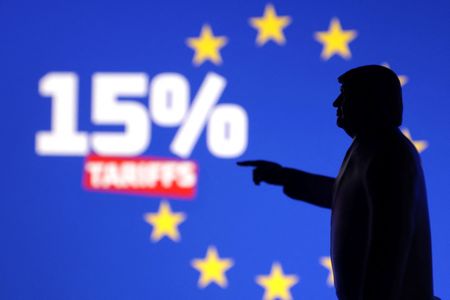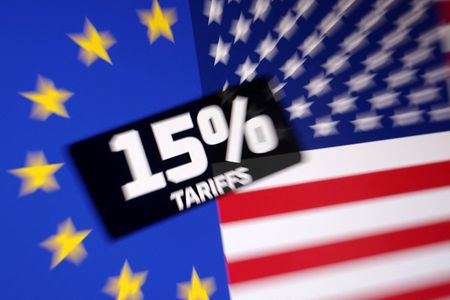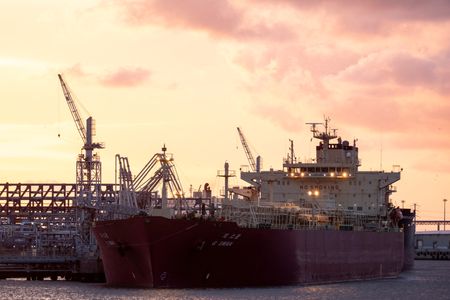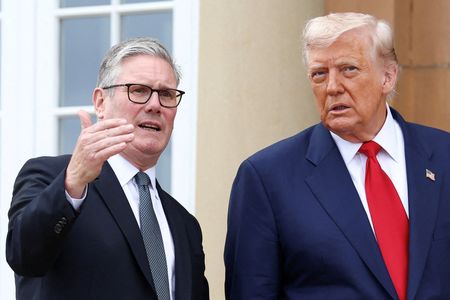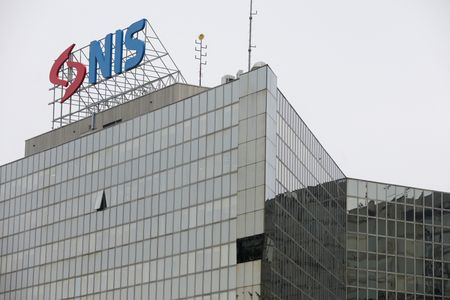By Christina Amann and Philip Blenkinsop
BRUSSELS (Reuters) -Europe’s carmakers, already battling stiff competition from Asia and a costly transition to electric cars, were dealing with another dose of reality on Monday – tariffs imposed by U.S. President Donald Trump.
A deal on Sunday to avert an all-out trade war between the European Union and the United States brought some relief, but the agreed lower tariff of 15% (versus 27.5%) is still set to cost carmakers billions and leaves much uncertain.
“We think that despite the relief of a better than-worst-case tariff outcome, the (removal of the) upside risk of a deal is leaving the sector vulnerable for a reality check,” Barclays said in a note.
Industry welcomed the planning security brought by the deal, but warned that companies were still lacking detail and called for further measures to reduce trade barriers that threaten their export-focused businesses.
Germany’s VDA association for the sector said the 15% baseline tariff would cost the German automotive industry billions annually.
The United States, the world’s biggest importer of German cars, had slapped a 25% punitive rate on car imports from Europe in April, prompting companies to slash their outlooks and look at ways – from investments to production shifts – to appease President Trump in the trade war.
While the 15% tariff agreed between Trump and European Commission President Ursula von der Leyen on Sunday is an improvement, it is six times as much as the 2.5% enjoyed by exporters before Trump’s trade war.
European auto stocks rose briefly on Monday, but the initial optimism quickly faded, with the sector down 1.2% at 1325 GMT, led by Volkswagen, BMW, Mercedes and Stellantis.
“We welcome the agreement between the EU and the U.S. in the tariff dispute and the planning security that comes with it for the European automotive industry,” Volkswagen said in a statement to Reuters.
CONSTRUCTIVE DIALOGUE
Europe’s largest carmaker said last week it was hoping for a separate deal of its own on top of a renegotiated U.S.-EU trade framework.
Mercedes-Benz called for “constructive dialogue” between Brussels and Washington as they work to implement the deal, parts of which require further negotiation.
Tariffs cost Volkswagen some $1.5 billion in the first half of 2025, prompting the company to lower its sales and profitability guidance for the full year.
Its luxury brands Porsche and Audi, which also cut its guidance on Monday, are particularly exposed to U.S. tariffs with no local production.
Part of von der Leyen’s deal with Trump also included a promised $600 billion in investment from European companies in the U.S.
Volkswagen CEO Oliver Blume said last week that his company is in talks with the U.S. Department of Commerce and offers a “very attractive investment package”. He raised the possibility of building an Audi factory in the country.
It was not clear whether such possible investments are included in the sum promised by von der Leyen, raising questions over the leverage carmakers have in their separate talks with Washington for sector-specific relief.
For its part, the European Union agreed to cut its import duty on U.S.-made cars to 2.5%, an EU official said on Monday.
Sources said this could go down further to zero.
BMW and Mercedes stand to benefit from this, given they both produce SUVs out of large factories in the United States for the world market.
The two companies have supported a proposed mechanism to offset imports and exports for more favourable trade conditions.
(Writing by Rachel More; Editing by Sudip Kar-Gupta and David Holmes)

